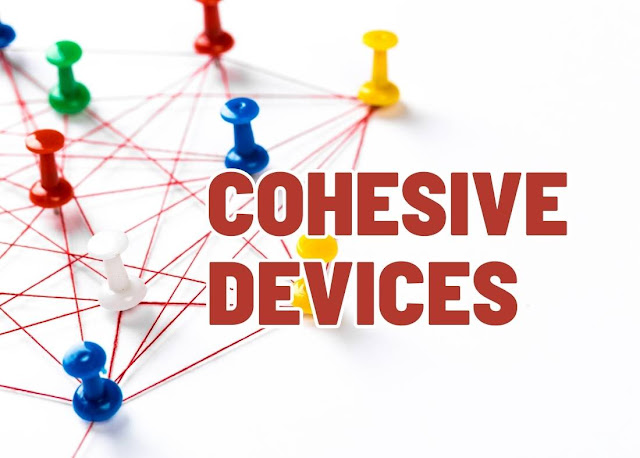In spite of their high sounding names, Cohesive Devices are words or phrases that we use quite often to connect phrases, sentences and paragraphs. They are also called Discourse Markers, Linking Words, Connectors, and Transitional Words.
These words are used in both spoken and written English.
To show continuity or progress (Sequencing / Structuring)
First, firstly, secondly, then, next, after that, lastly, first of all, finally, to begin with, to start with, meanwhile, then, subsequently
For example, if you want to give instruction to someone about how to operate an ATM machine, you may use these cohesive devices as below:
To begin with, insert your ATM card into the card slot. Firstly, make sure the card is facing the correct way. Then, the machine will prompt you to enter your PIN. Next, use the keypad to type in your four-digit PIN carefully. After that, select the type of transaction you want, such as withdrawing cash. Meanwhile, the machine will process your request. Subsequently, it will dispense the cash and print a receipt. Lastly, take your card, cash, and receipt from the machine. Finally, ensure you've collected everything before leaving the ATM.
To add information
And, therefore, furthermore, moreover, in addition, too, also, besides
Examples:
I went to the store, and I bought some fresh fruit.She studied hard, therefore she passed the exam with flying colors.
The book was interesting, furthermore, it was very informative.
The weather was perfect for hiking, moreover, the scenery was beautiful.
He’s a great musician, in addition, he can paint exceptionally well.
She loves chocolate, too.
I enjoy reading, also, I like writing short stories.
I’m not only tired, besides, I have a lot of work to do.
To express contrast or contradiction
But, although, though, even though, despite, in spite of, whereas, while, however, nevertheless, albeit, yet, still, on the contrary, even so
She wanted to go to the party, but she had to work late.
Although it was raining, they decided to go for a walk.
The movie was long, though it was entertaining.
Even though he was tired, he finished the project.
Despite the traffic, she arrived on time.
In spite of his injury, he played in the match.
She enjoys classical music, whereas he prefers jazz.
He studied hard, while his friends were out having fun.
The team played well, however, they didn’t win the game.
She was feeling ill, nevertheless, she attended the meeting.
The solution was effective, albeit temporary.
It was a difficult task, yet they managed to complete it.
He made a mistake, still, he learned from the experience.
I didn’t like the idea at first, on the contrary, I opposed it.
The weather was terrible, even so, they went on the hike.
To give reason
Because of, as, since, due to , owing to, for
Because of the heavy rain, the event was canceled.
As she was feeling unwell, she decided to stay home.
Since he had no time, he skipped breakfast.
The flight was delayed due to technical issues.
Owing to the high demand, the prices increased.
She was late for the meeting because of traffic.
To show the result
So, as a result, therefore, consequently
It started raining heavily, so we had to cancel the picnic.
She missed the deadline, as a result, her project was delayed.
He didn’t study for the exam, therefore he didn’t pass.
The company lost a major client, consequently, their profits decreased.
To give the purpose
In order to, so, so that, so as to, so as not to
She studied hard in order to pass the exam.
He saved money so he could buy a new car.
I set an alarm so that I wouldn’t oversleep.
They left early so as to avoid the traffic.
She whispered so as not to wake the baby.
To illustrate
For example, for instance, in particular
There are many types of fruits that are good for your health. For example, apples and oranges are rich in vitamins.
She enjoys various outdoor activities. For instance, she loves hiking and kayaking.
The museum has many interesting exhibits. In particular, the ancient artifacts are fascinating.
To compare
Similarly, in the same way, likewise, like, equally
She enjoys classical music. Similarly, her brother likes jazz.
He approached the problem methodically. In the same way, his colleague tackled it with a systematic approach.
The new software is user-friendly. Likewise, the previous version was easy to use.
The author’s writing style is engaging, like that of his favorite writer.
The two teams performed well this season. Equally, their efforts were commendable.
To generalize
On the whole, in some cases, in general, in all, many, most, broadly speaking
On the whole, the project was a success, despite a few minor issues.
In some cases, people might prefer working from home rather than in the office.
In general, exercise is beneficial for maintaining good health.
In all, there were twenty participants in the workshop.
Many students found the new teaching methods effective.
Most people enjoy a good book or movie for relaxation.
Broadly speaking, the company’s performance improved over the past year.
Though, although and even though
Although I was sick, I didn't want to miss the class.
Though she reached on time, the boss was not pleased.
Though is slightly less formal than although. So 'although' is used more in written English.
Even though shows a greater contrast, or even a bit of surprise.
Even though he did not attempt half the questions, he passed the exam.
If there is an element of surprise, you can use 'even though'
Try these Cohesive Devices Exercises


Post a Comment
Links will not work in comments